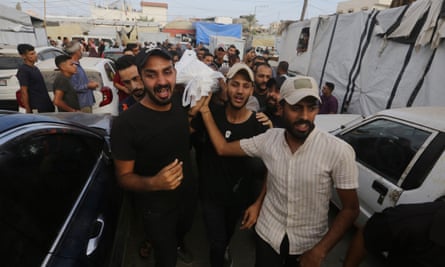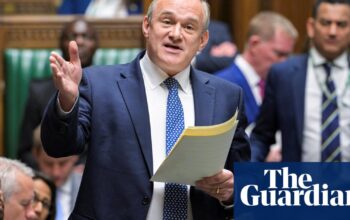Keir Starmer has called for unity in Britain and urged the nation to “unequivocally stand with the Jewish community”, as he reiterated calls for immediate ceasefires in Gaza and Lebanon on the anniversary of the 7 October attacks.
The prime minister described it as “the darkest day in Jewish history since the Holocaust”, reflecting on the deaths of more than 1,000 people who were murdered by Hamas, including the young people massacred at a music festival, raped and brutally tortured in the aftermath.
While he stood firm in his commitment to help “bring the hostages home”, he said “we must not look the other way as civilians bear the ongoing dire consequences of this conflict in the Middle East”.
He continued: “We will not falter in our pursuit of peace and on this day of pain and sorrow, we honour those we lost, and continue in our determination to return those still held hostage, help those who are suffering, and secure a better future for the Middle East.”
His comments come as the government earlier advised Israel to show “restraint”, while the prime minister had warned that “sparks” from the Middle East conflict could “light touchpapers in our communities at home”.
A series of rallies and demonstrations took place over the weekend, with more expected to take place around the country on Monday.
In London, the Met police said 17 people had been arrested after Saturday’s pro-Palestinian march in central London, as part of a “significant” policing operation in response to planned protest and memorial events.
On Sunday afternoon, thousands of people arrived at a memorial event being held in London’s Hyde Park, organised by the Board of Deputies of British Jews, the Jewish Leadership Council and other groups. Supporters waved Israeli flags and placards with the faces of the hostages still being held by Hamas in Gaza as they chanted “bring them home”.
The mother of the sole British hostage still in Gaza a year after she was taken by Hamas said her daughter has been “stripped of every human right” and remains “in hell”, as she called for her safe return.
Mandy Damari spoke about her daughter Emily publicly for the first time, through tears, and called for the release of the 101 hostages who remained in Gaza, saying each one was someone’s child, grandchild, parent or grandparent.
“How is it that she [Emily] is still imprisoned there after one year?” Damari said.
“Why isn’t the whole world, especially Britain, fighting every moment to secure her release?”
Also at the event was Tracy-Ann Oberman, the actor and playwright, who said “we must not forget our humanity”, adding it was “heartening” to see so many people in attendance.
“I’m here today because it’s about memorial and remembrance,” she said. “It’s about remembering the terrorist attack on 7 October. It’s about remembering our dead and it’s about remembering our hostages, some of whom are still alive and who we desperately want to bring home.”
The mayor of London, Sadiq Khan, said in a statement: “I know, like me, Jewish and Muslim Londoners – and Londoners of every religion and of no organised faith – have been left distressed and utterly heartbroken by the cycle of terror, bloodshed and suffering that has engulfed the region. Many of us have seen images, or read news reports, of the horrors on 7 October and in Palestine that will haunt us for the rest of our lives.”
He repeated his call for a ceasefire and acknowledged the impact of the violence abroad has had on London’s communities. “We cannot allow conflict overseas to divide us here at home,” he said.
In Waterloo a group of Jewish and Muslim women came together to mark the anniversary and to help “stop the hate on [Britain’s] streets”.
Dubbed a “safe space” by organisers, the group of six Jewish women and six Muslim women shared their feelings of “exhaustion”, “pain” and “suffering”, often through tears, but were also keen to express their “hope” and “gratitude” that they felt had come from similar acts of unity.
Organisers Julie Siddiqi, a Muslim, and Laura Marks, who is Jewish, are co-founders of the Nisa-Nashim Jewish and Muslim Women’s Network.
They told the PA news agency the meeting was a symbol of cross-faith unity against hatred and “not being made to feel we have to pick sides”.
Thousands also gathered in Manchester city centre for a pro-Israel march and rally, including Greater Manchester MPs Josh Simons and Christian Wakeford.
after newsletter promotion
The Met said it was likely that events and gatherings of various sizes would take place across London on Monday.
Peter Kyle, a UK cabinet minister, speaking on the BBC One’s Sunday with Laura Kuenssberg programme, said: “We do understand deeply what Israel has suffered in this year, but the only way forward is restraint, a ceasefire to create the space for a political solution, because this is getting more complicated. The war is deepening and it is not moving towards the peace that we need, so we are urging the steps that will take us towards that peaceful settlement”.
The prime minister, in an article for the Sunday Times, called out the “vile hatred” that had been directed towards Jews and Muslims since the 7 October attacks.

He urged all parties involved in the conflict to “act with restraint and return to political, not military solutions”, having previously expressed his concern that the “region is on the brink” after Iran’s missile attack on Israel. Writing in the newspaper, he said: “The flames from this deadly conflict now threaten to consume the region. And the sparks light touchpapers in our own communities here at home.”
He added: “There are always some who would use conflict abroad to stoke conflict here. Since October 7, we have watched vile hatred against Jews and Muslims rise in our communities.”
The Foreign Office said more than 250 people had been able to leave Lebanon so far on the three chartered flights that had already left Beirut. There are no further scheduled charter flights, but the situation would be kept under review.
The shadow foreign secretary, Andrew Mitchell, told Sky News’s Sunday Morning with Trevor Phillips programme: “The Iranians, of course, have already responded and on both occasions when they attacked – directly from Iran – Israel, British military forces were engaged in trying to help.
“Israel is a very strong ally. Of course we want to see de-escalation, we want to see negotiation and we want to see people’s eyes lifted towards the possibility of a political solution.”
Zarah Sultana, an MP who was suspended from the Labour party for rebelling over the two-child benefit cap and is now sitting as an independent, told the BBC “there is no scenario” where the UK’s involvement in an attack on Iran could be justified.
She added: “If we look at the past two decades of British foreign policy in the Middle East there are catalogues of failures and clearly lessons haven’t been learned. When we look at what the British public think, 56% of them back a ban on arms sales to Israel, only 17% oppose that, 67% believe Israel has committed war crimes and 84% want Netanyahu arrested if he enters the UK. Clearly there’s a detachment from the British public opinion and what the government are saying.”
The former Conservative foreign secretary, Malcolm Rifkind, said what was needed from Israelis and Palestinians was “leadership that is prepared not to forget the past, but to move on to a political dialogue”.
Source: theguardian.com


